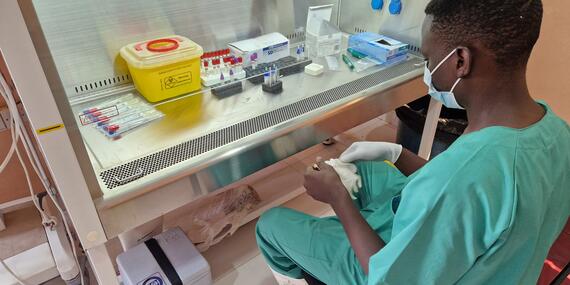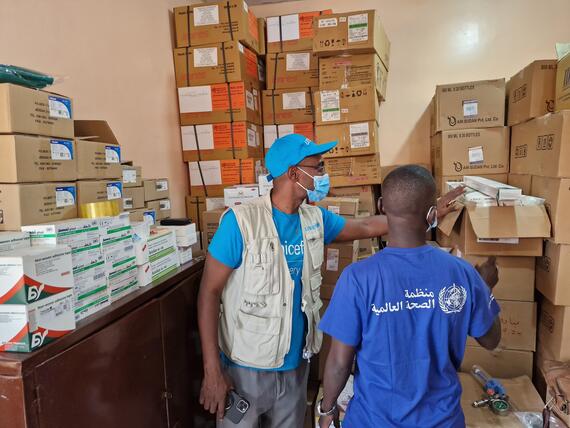Sudan: Supporting treatment of people with cholera

By Alimbek Tashtankulov, OCHA Sudan
Gedaref: Upon entering a seemingly unassuming building in the Gedaref Teaching Hospital complex, my shoes were sprayed, and I was asked to wash my hands with water that smelt strongly of chlorine. This is the Cholera Treatment Centre (CTC) established by the State Ministry of Health (SMoH) and recently renovated by the UN Refugee Agency (UNHCR), with supplies provided by the World Health Organization (WHO). The CTC has 30 beds with room to add 20 more.
In one of its wards, I found 70-year-old Elhaj Idris who had been suffering from diarrhoea, vomiting and had had a headache for several days before he was brought by his relatives to the CTC. “I was feeling so weak and bad, but now I feel a bit better,” said Elhaj in a frail voice while getting medication through an intravenous drip.
“He is one of the 11 patients currently at our centre that have been confirmed positive for cholera by rapid diagnostic tests [RDT],” said Muataz Bukhari, one of the medical doctors at the centre. Muataz was working in Khartoum before the conflict started in mid-April but was displaced like some of his colleagues. “I moved to Gedaref around the first week of May [2023] as I have extended family here and am staying with them,” he said.
In another room, Shamaa, a 28-year-old patient, who had diarrhoea said, “I am doing better now, but I still have a bad headache.”
An 83-year-old patient’s condition has been of great concern to the doctors and nurses at the centre. “He was transferred to our centre from the ICU [intensive care unit] … along with cholera he has diabetes, pneumonia and was suffering from convulsions,” explained Muataz. “We were very worried about him when he first came to us, but now his condition is improving.”

Preparing for more cases
The first cholera case in Gedaref this year was reported on 26 August, according to the SMoH. As of 7 October, 409 suspected cases and 23 associated deaths had been reported, of which 197 were confirmed positive by RDTs. According to the SMoH and WHO, many of the initial suspected cholera cases have been reported in Khatir village in Eastern Galabat locality, which borders Ethiopia.
Ahmed Haroun, deputy head of WHO’s sub-office in Gedaref, said, WHO had provided cholera treatment supplies for 300 severe cases, and beds to equip a CTC.
A Government-led taskforce has been activated to coordinate interventions, identify gaps and make recommendations.
WHO is also supplementing the remuneration to doctors, nurses, and all support staff at this particular CTC from October till the end of 2023. “For more than five months, we have basically been working as volunteers, without any salaries. We are very glad that we will be able to receive some financial support from WHO,” said one of the nurses.
Muataz showed the “clean area” where the doctors, nurses and other staff stay and rest between shifts. Some workers were installing pipes to ensure the facility has a constant supply of clean water for patients and staff.
Support for labs and training of health workers
Meanwhile, WHO is supporting the deployment of rapid response teams to the affected localities. It is also helping the Ministry of Health to transfer samples of suspected cholera cases to the Public Health Laboratory in Port Sudan. WHO provides equipment and supplies to the Public Health Laboratory Surveillance is ongoing in affected and high-risk areas to identify and address risk factors.
Earlier this year, more than 2,800 Sudanese health workers took part in an online capacity-building programme by WHO on the management of acute watery diarrhoea in times of crisis. Another online training course, on cholera, dengue and malaria management protocols, took place this week, for more than 8,000 Sudanese health workers. On-the-job training on surveillance and standard case management for cholera and other infectious diseases was also conducted in Gedaref for 185 health workers.
